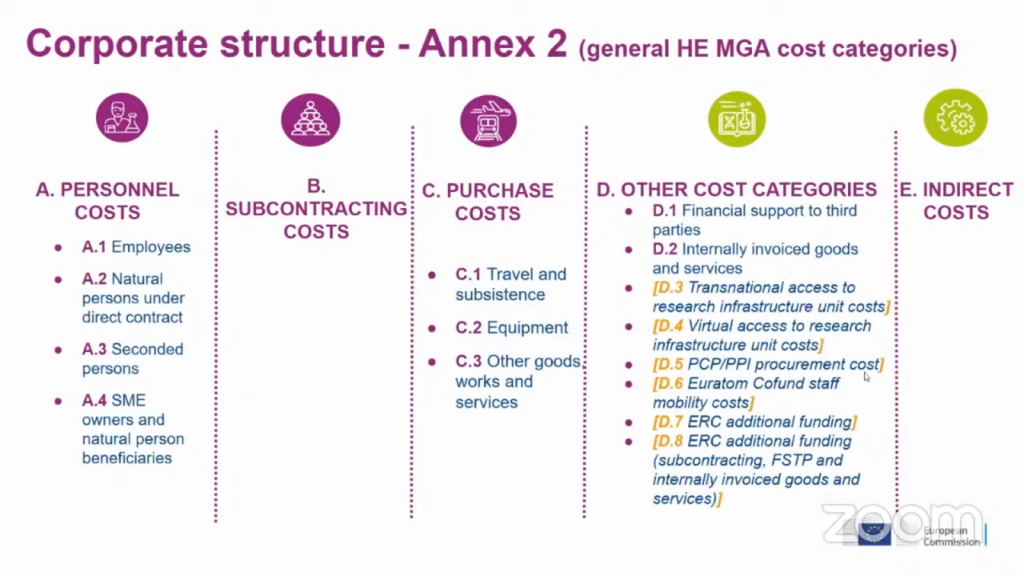

How to use unit costs for travel costs in EU funded projects

Select your type of organisation: Select Academia Industry Media Policy Other
I want to subscribe to Innovarum´s Newsletter Subscribe Unsubscribe
I have read and agree to the terms & conditions
About the Author: Paula Morán
Commission Decision C(2021)35, as amended by Commission Decision C(2023)4928 , authorises the use of unit costs for the reimbursement of eligible travel costs awarded under any action or programme financed by the Union budget under the 2021-2027 MFF period [1] .
Please note that the unit costs used for this Decision were calculated before the pandemic, therefore, an additional 25% should be added to each of the amounts indicated in the Decision. This means that eligible travel costs will cover the trip (round trip) based on the distance, in kilometres, that separates the point of origin from the destination, also taking into account the destination country (or if it is national travel).
The EC has also set up a site to help calculate your eligible unit costs for travel costs, which can be found here: LINK .
How does it work?
Transportation costs.
For travels with a distance over than 400 km (regardless of the means of transport, plane/train), the cost would be that of the following table, to which an additional 25% should be added. Please note that, if you use a combination of plane + train for a 500 km trip, the cost would be 245+25% in total, it would not be doubled because they are two different means of transport.

For travels by land and distances under 400km within the same EU country , the cost would be that of the following table, to which an additional 25% should be added.

For travels by land and distances under 400km between two EU Member States , the cost would be as shown in the following table, looking at the country of origin and destination. Always remember to add an additional 25%.

Accomodation costs
The EC establishes the following costs per night for 1 person depending on the country. Remember that an additional 25% has to be added.

Subsistence costs
Works as accommodation costs, there is an EC assignation for 1 person per day depending on the country (the additional 25% should also be added here).

The total eligible costs for the travel are the sum of transportation + accommodation + subsistence unit costs.

Measuring the Impact: Effective Strategies for Evaluating EU Project Communication in Horizon Europe
In Horizon Europe, an accurate measurement of the impact of the communication and dissemination actions of your EU-funded project has become crucial. Whether it's sharing research findings, engaging with the public, or promoting project [...]

10 years of Innovarum
Last Friday 12th April, Innovarum celebrated its more than 10 years of history in a unique event surrounded by family and friends. In this post we tell you how it was such a special day, [...]

Ensuring an accessible bioeconomy: MainstreamBIO digital toolkit
Adopting the bioeconomy may feel a lonely journey, but it is not! Plenty of people have already implemented bioeconomy practices and initiatives. MainstreamBIO has developed a digital toolkit to help you learn about existing [...]

Innovarum attends the General Assembly of Like-A-Pro in Wuppertal, Germany
Our colleagues from Innovarum Adrián Escribano and Ana Díaz attended the General Assembly of LIKE-A-PRO, held at Codeks Factory in Wuppertal on April 9th and 10th, 2024. As pioneers in innovative solutions, we were [...]

Horizon Europe Cluster 6 calls: Insights and Recommendations for applicants
In our previous blog post, we delved into the success rate and average budget of the first 2024 call for proposals within Cluster 6, whose last deadline for submission was on 28th February. In [...]

Closure of Horizon Europe Cluster 6 Calls: Assessing the Impact
On February 28th, the latest round of calls for proposals under Cluster 6 of Horizon Europe ended. In this blog post, we delve into the success rate and average budget of the 2024 first call [...]
#WeMakeInnovationHappen
Do you have an idea for a project, are you looking for a partner for communication or the development of innovative business models, or do you have other innovative initiatives in mind?
Legal Notice & Privacy Policy Ⓒ 2023 Innovarum | Cookie Policy | All Rights Reserved
First party cookies-necessary
Tracking cookies-non necessary, statistics.
- Tracking Cookies
Third party cookies - Non necessary, functional
- Google Maps

What costs are eligible in Horizon Europe?
- Post author: EU Funds
- Post published: May 17, 2021
- Post category: Horizon Europe
There are five eligible cost categories in Horizon Europe : personnel, subcontracting, purchase, other, and indirect costs. Below the complete list of costs eligible in Horizon Europe with extract from the General Model Grant Agreement GMGA Article 6.2 – Specific eligibility conditions for each budget category.

- A.1 Costs for employees (or equivalent) are eligible as personnel costs if they fulfill the general eligibility conditions and are related to personnel working for the beneficiary under an employment contract (or equivalent appointing act) and assigned to the action. […]
- A.2 and A.3 Costs for natural persons working under a direct contract other than an employment contract and costs for seconded persons by a third party against payment are also eligible as personnel costs, if they are assigned to the action, fulfill the general eligibility conditions […]
- A.4 The work of SME owners for the action (i.e. owners of beneficiaries that are small and medium-sized enterprises not receiving a salary) or natural person beneficiaries (i.e. beneficiaries that are natural persons not receiving a salary) may be declared as personnel costs, if they fulfill the general eligibility conditions and are calculated as unit costs in accordance with the method set out in Annex 2a.
- Subcontracting costs for the action (including related duties, taxes and charges, such as non-deductible or non-refundable value added tax (VAT) are eligible, if they are calculated on the basis of the costs actually incurred, fulfill the general eligibility conditions and are awarded using the beneficiary’s usual purchasing practices — provided these ensure subcontracts with best value for money (or if appropriate the lowest price) and that there is no conflict of interests (see Article 12). […]
- Purchase costs for the action (including related duties, taxes and charges, such as non-deductible or non-refundable value added tax (VAT) are eligible if they fulfill the general eligibility conditions and are bought using the beneficiary’s usual purchasing practices — provided these ensure purchases with best value for money (or if appropriate the lowest price) and that there is no conflict of interests (see Article 12).
- Beneficiaries that are ‘contracting authorities/entities’ within the meaning of the EU Directives on public procurement must also comply with the applicable national law on public procurement.
- travel: on the basis of the costs actually incurred and in line with the beneficiary’s usual practices on travel
- accommodation: on the basis of the costs actually incurred and in line with the beneficiary’s usual practices on travel
- subsistence: on the basis of the costs actually incurred and in line with the beneficiary’s usual practices on travel.
- Purchases of equipment, infrastructure or other assets used for the action must be declared as depreciation costs, calculated on the basis of the costs actually incurred and written off in accordance with international accounting standards and the beneficiary’s usual accounting practices.
- Only the portion of the costs that corresponds to the rate of actual use for the action during the action duration can be taken into account.
- Costs for renting or leasing equipment, infrastructure or other assets are also eligible, if they do not exceed the depreciation costs of similar equipment, infrastructure or assets and do not include any financing fees. […]
- Purchases of other goods, works and services must be calculated on the basis of the costs actually incurred.
- Such goods, works and services include, for instance, consumables and supplies, promotion, dissemination, protection of results, translations, publications, certificates and financial guarantees, if required under the Agreement.
- Costs for providing financial support to third parties (in the form of grants, prizes or similar forms of support; if any) are eligible, if and as declared eligible in the call conditions, if they fulfill the general eligibility conditions, are calculated on the basis of the costs actually incurred and the support is implemented in accordance with the conditions set out in Annex 1. […]
- Costs for internally invoiced goods and services directly used for the action may be declared as unit cost according to usual cost accounting practices, if and as declared eligible in the call conditions, if they fulfill the general eligibility conditions for such unit costs and the amount per unit is calculated… […]
- D.3 Transnational access to research infrastructure unit costs […]
- D.4 Virtual access to research infrastructure unit costs
- D.5 PCP/PPI procurement costs
- D.6 Euratom Cofund staff mobility costs
- D.7 ERC additional funding
- D.8 ERC additional funding (subcontracting, FSTP and internally invoiced goods and services)
- Indirect costs will be reimbursed at the flat-rate of 25% of the eligible direct costs (categories A-D, except volunteers costs, subcontracting costs, financial support to third parties and exempted specific cost categories, if any).
References:
GMGA Article 6.2 – Specific eligibility conditions for each budget category (Costs eligible in Horizon Europe)
You Might Also Like

How to report personnel unit costs in Horizon Europe?

Are extra payments eligible in Horizon Europe?

Who can issue a Certificate on the Financial Statement (CFS) after an audit?


What costs are eligible or ineligible in Horizon Europe?

Where to find the reference documents for Horizon Europe?

What is the funding rate in Horizon Europe?

What are the missions of Horizon Europe?

Is Israel eligible for Horizon Europe?

How to calculate indirect costs (overheads) in Horizon Europe?

Is Norway eligible for Horizon Europe?

Where can I find the templates for Horizon Europe proposals?

Can months with absences be declared in Horizon Europe?
Do you need help in managing your eu project, contact us we can help you.

Results will be shown on another page
- President President Vasco Alves Cordeiro was elected President of the European Committee of the Regions in June 2022. Read more
- First Vice-President First Vice-President Apostolos Tzitzikostas was born on September 2, 1978. He studied Government and International Relations at Georgetown University, in Washington DC. After graduating in 2000, he had his first working experience at the Office of the President of the Committee on Foreign Affairs of the United States Congress. In 2002 he obtained a Masters Degree on European Public Policy and Economics from the University College of London. Following his studies, he created his own company on the field of production, processing and standardization of dairy products, based on organic standards. Read more
- Secretary-General Secretary-General The Secretary-General of the European Committee of the Regions has overall responsibility for preparing proceedings and implementing decisions taken by the statutory bodies: The Plenary Assembly, the Bureau, the Conference of Presidents and the President himself. Read more
- Protocol service Protocol service As the EU's assembly of local and regional representatives, the European Committee of the Regions is a political institution whose work involves maintaining close relations with senior representatives at European, national, regional and local levels. Read more
- 30th Anniversary 30th Anniversary The European Committee of the Regions is the European Union's assembly of local and regional elected leaders. It provides representation for all the European Union's territorial areas, regions, cities and municipalities. 9-10 March 2024 marks the 30th anniversary of the first plenary session, addressed by the President of the European Commission Jacques Delors. Our headquarters building bears his name. Read more

- Tenders Tenders The European Committee of the Regions uses tendering and other processes to carry its work. Learn more in this page and find all relevant information. Read more
- The State of Regions and Cities in the European Union The State of Regions and Cities in the European Union On 9 October 2023, the Committee of the Regions has published its EU Annual Report on the State of Regions and Cities, as a snapshot of the most pressing challenges faced by regions and cities across Europe, as well as solutions from the ground to inform EU policy decisions. Read more
- Political priorities 2020–2025 Political priorities 2020–2025 Local and regional authorities, represented in the EU by the European Committee of the Regions, have always been the backbone of European democracy. The recent COVID-19 pandemic showed local and regional leaders as the driving force of local communities, responding during the emergency and leading the EU's recovery. Bringing Europe closer to people through its villages, cities and regions will therefore be the primary mission of our Committee achieved through three main priorities. Read more
- Plenary sessions Plenary sessions The European Committee of the Regions (CoR) holds up to 6 plenary sessions each year. Plenary sessions give the opportunity for CoR Members (or Alternates) to voice their opinions on EU law that may have an impact on regions and cities in the 27 EU countries. Read more
- Bureau Bureau The Bureau is a group of CoR members that can be thought of as CoR's political driving force: it draws up its political priorities and oversees their implementation. The Bureau meets before each plenary session to coordinate the work of the plenary assembly and the commissions. It also gathers two times a year in extraordinary meetings in the EU country holding the Presidency of the Council of the EU. Read more
- Conference of Presidents Conference of Presidents The Conference of Presidents (CoP) consists of the President, the First Vice-President and the Presidents of all political groups. The CoP prepares the work and facilitates the search for political consensus on decisions to be taken by the other constitutive bodies (the Plenary Assembly, the Bureau, and the commissions).The CoP meets ahead of each Bureau meeting, usually on the same day. Extraordinary meetings are also organised in Brussels or abroad, notably twice a year in the EU country holding the Presidency of the Council of the EU. Read more
- Opinions Opinions The European Commission consults the European Committee of the Regions (CoR) at the earliest stage in the European legislative process on policy areas that directly affect the local and regional authorities. The CoR may also proactively adopt a position on a particular issue through an own-initiative opinion. Read more

- Interregional groups Interregional groups Established as from February 2007, interregional groups are platforms to exchange views and create new ideas between local and regional authorities in the Member States and beyond. Read more
- Networks Networks CoR networks enable regions and cities to contribute to the EU debate and to exchange experiences and best practice in specific EU policies.CoR networks enable regions and cities to contribute to the EU debate and to exchange experiences and best practice in specific EU policies. Read more

- National delegations National delegations National delegations are made up of CoR members from each of 27 EU countries. They reflect the political, geographical and local balance of each Member State. Read more
- Members' portal Members' portal Read more
- Newsletter Newsletter Personalized Newsletter from the European Committee of the Regions. Read more
- European Week of Regions and Cities European Week of Regions and Cities The European Week of Regions and Cities is the biggest annual event dedicated to regional policy. During this annual four-day event, regions and cities showcase their capacity to create growth and jobs, implement European Union cohesion policy, and prove the importance of the local and regional level for good European governance. Read more
- EuroPCom EuroPCom EuroPCom, the European Public Communication Conference, is an annual conference and networking event for communication experts from local, regional, national and European authorities, as well as private communication agencies, NGOs and academia. Since its launch in 2009, EuroPCom has featured high-level speakers from the world of public communication, workshops, participatory ideas labs and training sessions, plus a EuroPCom Market Place for participants to network and engage with exhibitors. Read more
- Summits Summits Every two years, the European Committee of the Regions (CoR) holds a European Summit of Regions and Cities. Read more

- Visit us Visit us The European Committee of the Regions (CoR) organises information visits for members of the public who want to find out more about how the CoR operates and about the role of the regions in shaping the content of European Union legislation. Read more
Travel costs
Members of the European Committee of the Regions (CoR) are representatives of regional and local bodies who either hold a regional or local authority electoral mandate or are politically accountable to an elected assembly. In some Member States, they receive some kind of remuneration from their regional or local body. However, they do not receive any remuneration from the CoR.
Members participate in meetings of the CoR, such as plenary sessions, commission meetings and political group meetings, which in most cases take place in Brussels, although they occasionally take place elsewhere. At times, members are also authorised to participate in meetings that are not organised by the CoR but are of particular interest to its work.
Upon presentation of the supporting documents, members are reimbursed for the actual cost of their transport tickets for attending such meetings, up to business class for air transport and up to first class for travel by rail or boat. If travelling by car, members are reimbursed according to a flat rate per kilometre of EUR 0.30. For their convenience, members may book their transport tickets via the CoR travel agency, in which case the CoR pays directly for them.
Besides the reimbursement of their transport expenses, members receive a flat-rate meeting allowance of EUR 340 per meeting day to cover all their costs at the meeting place (in most cases Brussels), such as meals, hotel fees, etc. This allowance takes into account the relatively high prices of accommodation in Brussels on working days.
Members also receive a flat-rate travel allowance that is based on the total distance of the journey and covers all the costs during the journey. These include, for instance, motorway tolls or vignettes, public transport in Brussels, parking fees at the airport or train station of departure, and meals, drinks and additional hotel fees during the journey or due to an extended stay at the meeting place. This allowance is only paid when the distance of the journey exceeds 200 km and it amounts to EUR 185 per reference unit (one single payment per round trip).
It should be noted that the EU Court of Justice considers that the use of a flat-rate allowance system, which is a common practice in the EU institutions, " arises from a concern to reduce the administrative costs and burdens inherent in a system involving the verification of each individual item of expense and therefore represents sound administration " (judgment of 15 September 1981 in case C-208/80, Lord Bruce of Donington ).
All the aforementioned expenditure is covered by the EU budget and is duly audited.
Remote meetings during the COVID-19 pandemic
The CoR has adopted a number of temporary measures to ensure the CoR's operational capacity during the COVID-19 pandemic, in particular its advisory role in the EU decision-making process, while at the same time avoiding health risks for members and staff. To this end, non-essential meetings have been cancelled and essential meetings such as those of the CoR constituent bodies are, to the extent possible, held remotely using electronic means (in some cases hybrid meetings are held with a group of the members located together in the same physical place). In these special circumstances where most members are working from their homes, the CoR pays them a flat-rate remote meeting allowance of EUR 200 per meeting day to cover their office and general expenses in preparing for and participating in meetings.
Search the FFG website
- Look for fundings. - Topic - Digitalisation & Broadband Energy Transition Europe & International Society & Security Wood: Research & Knowledge Transfer Innovative & Competitive Companies Climate-Neutral City Cooperation & Research Infrastructure Circular Economy Life Sciences & Health People, Qualification & Gender Mobility Transition Production & Materials Quantum: Research & Technology Space & Aviation Bottom-up Further research areas - Target group - Small and medium-sized enterprises (SMEs) Large companies Universities Universities of applied sciences Competence centres Research facilities Single researchers Start Up (Non-profit) Associations Authorities Multipliers / Intermediaries Youth national funding international funding
Travel costs in Horizon Europe
Travel costs include costs for arrival and departure , accommodation costs , per diems and all taxes and charges related thereto (e.g. non-deductible VAT, visitor's tax).
All travel costs must be in compliance with the usual practice for travel of the beneficiary (e.g. internal rules for business travel).
In addition, as for all costs charged to the project, the general eligibility criteria must be met. Evidence must be provided e.g. that the trip was necessary for the project , so that it has made an active contribution to the project.
Deviating from the rule that all costs must be incurred during the project duration, travel costs for the kick-off meeting are eligible even if the journey to the meeting takes place before the action starting date, provided that the meeting itself is held during the action duration. The same applies to the last project meeting at the end of the project.
Please note that all travel costs can be clearly assigned to the specific action.
The costs of combined travel (= project related purpose and non-project related purpose) can only be charged to the extent of the actual, project-related costs if
- it is the usual travel practice of the beneficiary to pay for such travels AND
- evidence of the actual travel, as well as of the theoretical only project-related travel is kept.
More information can be found ...
- in the Annotated Grant Agreement (AGA) ., Article 6.2.C.1.

Additional Information
- Legal and financial questions about Horizon Europe
- Overview of legal and financial aspects: project proposal
- Overview of legal and financial aspects: project implementation
- EC: Horizon Europe - reference documents
- Skip to main content
- assistive.skiplink.to.breadcrumbs
- assistive.skiplink.to.header.menu
- assistive.skiplink.to.action.menu
- assistive.skiplink.to.quick.search
Search Welcome
- A t tachments (0)
- Page History
- Page Information
- Resolved comments
- View in Hierarchy
- View Source
- Export to PDF
- Export to Word
Exceptional Cost for Expensive Travel
- Created by Arne Bo SORENSEN on Apr 28, 2022
In Beneficiary projects, this cost item is applicable to Erasmus+ KA1 mobility projects and European Solidarity Corps volunteering projects.
If the standard Travel Grant does not cover at least 70% of the eligible travel cost of the participant, you are entitled to request a grant to cover Exceptional costs for expensive travel instead of the standard travel grant.
Tick the relevant box for Request Exceptional Costs for Expensive Travel . Then type the Real Travel Cost in the relevant field. The Exceptional Cost for Expensive Travel Grant is calculated automatically as 80% of the Real Travel Cost. If you request the Exceptional costs for expensive travel grant, you must also fill in the additional field Exceptional cost for expensive travel description and justification.
- eac_naitdoc_search
- eac_naconnect_search
- gloss-entry
- implementation
- exceptional_cost_expensive_travel
- exceptional_costs
- 4_eac_naitdoc
- Powered by Atlassian Confluence 7.19.20
- Printed by Atlassian Confluence 7.19.20
- Report a bug
- Atlassian News
- About the Commission's new web presence
- Resources for partners
- Legal notice

The Annoying Additional Cost Many Tourists Don't Prepare For On A Trip To Europe
T raveling to Europe can be an incredible experience. Whether you're jetting off on a picture-perfect wine vacation , soaking up some sun at one of the continent's most under-rated (and breathtakingly gorgeous) beaches , or diving deep into all things ancient history while exploring some of Europe's oldest archeological sites , you're bound to see and do some pretty spectacular things.
However, in between the excitement that comes with planning and prepping for your travels, there's a not-so-pleasant reality to consider: things can get awfully expensive very quickly. Beyond flights — which range between $600 and $2,200 if you're flying New York to Madrid, for example — there are also plenty of other expenses to consider. First, there's the conversion fee of going from USD to euros, pounds, or other local currencies. On top of that, there are also the costs of accommodation, eating out daily, local transportation, shopping for souvenirs, and even splurging on a personalized tour guide to make the most of your experience . Whew — your wallet is shaking.
And if you thought your expenses stopped there, think again. Beyond these, there's one more unexpected cost in Europe that typically catches many travelers off guard: the sneaky tourist tax. Although it's not applied throughout all of Europe, there are various destinations that enforce it — and it can lead to an unexpected surprise when you're ready to leave.
Read more: 50 Weird Travel Facts You Didn't Know Were True
How Do Tourist Taxes Work In Europe?
Put simply, tourist taxes, also known as "city taxes," are extra fees imposed by local governments in various European cities and countries. The aim is to generate additional revenue from tourists that can, in turn, help fund infrastructure improvements, maintain popular attractions, and even promote sustainable tourism practices.
On most occasions, the tourist tax is usually added on to the nightly cost of a hotel or short-term rental. This fee is often based on a fixed rate per person per night, or on a percentage of the room rate. This ultimately means that, depending on your choice of accommodation — say, choosing a luxury hotel versus budget inn — the tax you pay can be higher or lower.
In addition to accommodation taxes, some countries also apply specific visitor fees for certain activities. For example, starting in April 2024, Venice implemented a day-trip fee — about $5.40 — for non-overnight visitors in order to regulate tourism and ease congestion.
European Cities Where Travelers Can Expect To Be Taxed
Knowing where you can expect to be hit with tourist taxes is an important step to make sure you budget your trip accurately. With that in mind, if you're planning on traveling to any of the following destinations, it's probably best to start putting aside some extra cash.
Kicking off the list is Portugal — with a total of 13 cities that participate in the scheme, including Lisbon and Porto — where you can expect to pay around $2 per person for every night's stay. Over in Barcelona, Spain, tourists should budget an additional $4.30 per night. In France, the additional charge is calculated through a municipal rate that ranges from 25 cents to $5.40 per night. The tourist tax varies in Germany, but in Berlin, there's a 5% fee added on to all accommodation costs.
Traveling to Amsterdam? You might be disappointed to learn that the Dutch city has one of the highest tourist tax schemes in Europe: an extra 7% on top of your accommodation price, plus an added fee of $3.30 a night. Other notable destinations that charge a city tax include Vienna, Austria, with a 3.2% fee on top of your accommodation cost; Brussels, Belgium, at roughly $4 a night; Croatia, between 25 and 90 cents per day; Greece, capped at $4.30 per night; and Italy, between $1 and $7.50 per night.
Read the original article on Explore

The golden age of golden visas is over in southern Europe
- Southern European economies have had remarkable recoveries since the financial crisis over a decade ago.
- But a surge in real estate investment, partly due to "golden visas", has led to skyrocketing housing costs.
- Northern Europe is also facing a housing crunch, despite very different economic conditions.

Southern European economies — from Greece to Portugal — have made remarkable recoveries since the European financial crisis just over a decade ago. Tourism is booming , investors and major businesses have moved in, and lots of foreigners are relocating to the region to take advantage of new jobs and a cheaper cost of living .
But one side effect of this growth is skyrocketing housing costs. Home prices and rents have soared in cities like Lisbon and Athens , while beach towns from Spain to the Greek islands are dominated by pricey short-term rentals.
This is in part the doing of so-called " golden visas ," hugely popular residency visas for foreign investors. In countries like Greece, Spain, and Portugal, most visa applicants qualify by buying residential property.
Americans make up a big portion of the foreigners flooding into southern European countries. They're gobbling up some of the most expensive real estate in Spain . They spent more per square meter on homes in Spain than any other nationality besides Danes, The New York Times reported last year. And they purchased more Portuguese golden visas than any other nationality in 2022 . Some are escaping increasingly unaffordable housing markets in the US . But they're now contributing to housing affordability issues across the Atlantic.
A surge in real estate investment has pushed home values way up, gentrifying in-demand cities , displacing longtime residents, and preventing young people from moving out of their parents' homes. Despite their booming economies, average southern Europeans still have relatively low wages and just can't compete with foreign investors, homebuyers, tourists, and remote workers.
Portugal, which has had one of the most popular and lucrative golden visas, rolled out its policy in 2012, fast-tracking visas for well-heeled foreigners, including those who transferred at least one million euros to a Portuguese bank account, purchased at least 500,000 euros in real estate, created at least 10 jobs, or donated at least 250,000 euros to certain cultural or artistic initiatives. The visa holders can travel freely in more than two dozen EU countries and are eligible for family reunification.
The visas have had a huge impact on Portuguese real estate and housing costs, João Pereira dos Santos, a researcher at the School of Economics and Finance at Queen Mary University of London, told Business Insider. The vast majority of visa holders have used a real estate purchase as their way in.
"They buy houses, so they do not invest and create jobs. And we know part of this housing is immediately put in the long-term and in the short-term rental markets," Pereira dos Santos said. "So these people that apply for the visa, they do not come to live in Portugal."
Portuguese home prices rose 19% just between 2021 and 2022. The whole market — from cheaper rentals to luxury houses — has been affected, Pereira dos Santos said. "The problem was so salient that it even appreciated houses that were deals between Portuguese buyers and sellers," he said.
Golden visas aren't all to blame. At the same time, Portugal, like the rest of sunny southern Europe, has seen a huge surge in tourists. Many emerged from pandemic lockdowns with the travel bug — and cash to spend. Last year was "the best year in the history of tourism in Portugal," the country's Secretary of State for Tourism, Trade and Services, Nuno Fazenda, told Bloomberg . The pandemic also ushered in a wave of remote workers and retirees looking for a high quality of life in relatively affordable European countries. New digital nomad visas for foreign remote workers have also juiced demand for housing.
Related stories
But as Portugal has experienced a worsening housing affordability crisis, Portuguese public opinion on golden visas has soured. Pereira dos Santos and his colleagues conducted a nationally representative survey in Portugal that found that a majority of respondents were in favor of ending the golden visa program even if it harmed the Portuguese economy to do so. Last year, the country changed the terms of its golden visa program to exclude real estate investment .
Other southern European countries are following suit, similarly pointing to skyrocketing real estate prices. Last month, Spain announced the end of its golden visa program, which was almost entirely dependent on foreign real estate investment.
Due to these measures, some of the most in-demand places in southern Europe will likely see slower housing price growth going forward. But because these economies are still doing so well overall, real estate prices will generally continue to tick up, Holger Schmieding, the chief economist at Berenberg Bank in London, told Business Insider.
"These economies are better places to invest and create jobs for domestic and for foreign investors into the economies as a whole," Schmieding said. "With better employment prospects people feel confident to buy a house or build a house. The real estate market is largely a reflection of the economy being on a more solid footing."
Northern Europe faces its own crunch
The economies of southern Europe are doing much better than the traditional powerhouses of northern Europe. Portugal and Spain grew more than three times as fast as Germany did in the first quarter of this year. But northern Europe is struggling with a housing crunch of its own.
The Netherlands has one of the most severe housing crises on the continent. Home prices have doubled , on average, over the last decade and now a newly-constructed home costs 16 times the average Dutch salary. Limits on building permits, a shortage of building materials and construction workers, and limited land have all contributed to the country's housing shortage.
Germany has seen a significant home price correction as it faced relatively high interest rates, an energy crisis, and new regulations requiring that homeowners switch from oil and gas heating systems to heat pumps that rely on renewable energy. That combination has helped dampen demand for homes and construction.
German housing prices are expected to start rebounding as the home heating policy becomes better understood, the European Central Bank signals it will soon cut interest rates, and wages rise faster than prices . "The German market for house prices is close to bottoming out, and the same probably holds for building permits and residential construction," Schmieding said.
France similarly saw housing costs steadily climb in recent years, but, like Germany, has seen its prices come down amid high interest rates. Schmieding also expects home prices and rents to tick back up later this year in France as long as interest rates come down.
The country is still facing housing affordability issues — a situation one prominent charity recently called "a social bomb" — with rising homelessness and a growing waitlist for social housing. The Paris Olympic games this summer are only intensifying housing demand in the capital, including for short-term rentals, which has reduced the number of rental apartments on the market .
Despite very different economic conditions, all kinds of European countries are facing the same dilemma that's plaguing the US: a shortage of affordable homes.
Axel Springer, Insider Inc.'s parent company, is an investor in Airbnb.
Watch: Was Italy's $1 home scheme worth it?
- Main content

IMAGES
VIDEO
COMMENTS
Commission Decision C(2021)35, as amended by Commission Decision C(2023)4928, authorises the use of unit costs for the reimbursement of eligible travel costs awarded under any action or programme financed by the Union budget under the 2021-2027 MFF period.This page provides two calculators to allow the granting authority calculate the relevant distance for identifying the correct unit cost ...
Travel unit costs have been updated! To try to compensate the extreme inflation in air travel since 2021, the rates for return air and rail travel above 400km have increased by 25%. date : 01/12/2023. On 26 July 2023 the Commission adopted an amendment to Decision C (2021)35 authorising the use of unit costs for the reimbursement of travel ...
with Decision C(2021)35 authorising the use of unit costs for travel, accommodation and subsistence costs. 3.2 Application of funding rates to travel costs The funding rate to be applied to the travel unit costs set out in Commission Decision C92021)35 for actions under CEF technical assistance shall be 100%, both under General
Commission Decision C (2021)35, as amended by Commission Decision C (2023)4928, authorises the use of unit costs for the reimbursement of eligible travel costs awarded under any action or programme financed by the Union budget under the 2021-2027 MFF period. Please note that the unit costs used for this Decision were calculated before the pandemic,
In accordance with Article 181.4(c)(i) of the Financial Regulation, the unit costs covered by this Decision are based on the objective means of pre-existing unit costs for staff costs in Member States and third countries for the Erasmus+ programme. The use of pre-existing staff unit costs are considered appropriate because the declared co-
We recommend using digital tickets and saving screenshots of all your tickets and boarding passes. You have to keep all receipts. Without proof, we cannot reimburse you. Please note that taxi fares and local public transport tickets are not eligible for reimbursement. Calculate your LevelUP! 2024 Travel Reimbursements with One Click!
costs. No matter if the actual costs are higher or lower. The travel unit cost to be paid is a fix amount and it depends on the distance between the place of departure and place of arrival. All unit costs are an amount to cover a return trip. However, the calculation of the distance should be done on the basis of the 1-way distance between the ...
of 12.1.2021. authorising the use of unit costs for travel, accommodation and subsistence costs under an action or work programme under the 2021-2027 multi-annual financial framework. THE EUROPEAN COMMISSION, Having regard to the Treaty on the Functioning of the European Union, Having regard to the Treaty establishing the European Atomic Energy ...
There are five eligible cost categories in Horizon Europe: personnel, subcontracting, purchase, other, and indirect costs. Below the complete list of costs eligible in Horizon Europe with extract from the General Model Grant Agreement GMGA Article 6.2 - Specific eligibility conditions for each budget category. A.1 Costs for employees (or ...
incurred costs: UNIT COSTS Type of transport Distance in road Km Travel Unit cost Car Any distance 0.33 €/Km Train Any distance 0.40 €/Km Flight Any distance 500 € If two or more staff members travel together sharing a car, the cost should be calculated only one time for the entire group of people.
Members also receive a flat-rate travel allowance that is based on the total distance of the journey and covers all the costs during the journey. These include, for instance, motorway tolls or vignettes, public transport in Brussels, parking fees at the airport or train station of departure, and meals, drinks and additional hotel fees during ...
Travel costs include costs for arrival and departure, accommodation costs, per diems and all taxes and charges related thereto (e.g. non-deductible VAT, visitor's tax).. All travel costs must be in compliance with the usual practice for travel of the beneficiary (e.g. internal rules for business travel).. In addition, as for all costs charged to the project, the general eligibility criteria ...
The Exceptional Cost for Expensive Travel Grant is calculated automatically as 80% of the Real Travel Cost. If you request the Exceptional costs for expensive travel grant, you must also fill in the additional field Exceptional cost for expensive travel description and justification. Expand all Collapse all.
Prices have also surged. Airfare to Europe is averaging just under $1,200 per round trip ticket, Hopper's lead economist Hayley Berg told Insider, a 37% increase compared to both 2019 and 2022. If ...
Over in Barcelona, Spain, tourists should budget an additional $4.30 per night. In France, the additional charge is calculated through a municipal rate that ranges from 25 cents to $5.40 per night ...
The visa holders can travel freely in more than two dozen EU countries and are eligible for family reunification. The visas have had a huge impact on Portuguese real estate and housing costs ...
In this regard, we invite you to read carefully the new Annex 2a of the Grant agreement on unit costs and contributions, the Annotated Grant Agreement (AGA) (in particular, page 24 point 6.1b, page 27 point 3 and pages 59-60 point 2) and to consult the Commission Decision that authorised the use of unit costs for travel, accommodation and subsistence costs under the new multi-annual financial ...
Find international travel requirements, including any forms you might need to complete. See what travel documents you need for your destination, including visa, passport, and health info. Travel to and from certain airports might be impacted. View our Travel Alerts page for the most up-to-date information about your flight options.
The material sent speeding away from the sun during coronal mass ejections can arrive at Earth between 30 and 72 hours afterward, causing geomagnetic storms that affect satellites and create ...